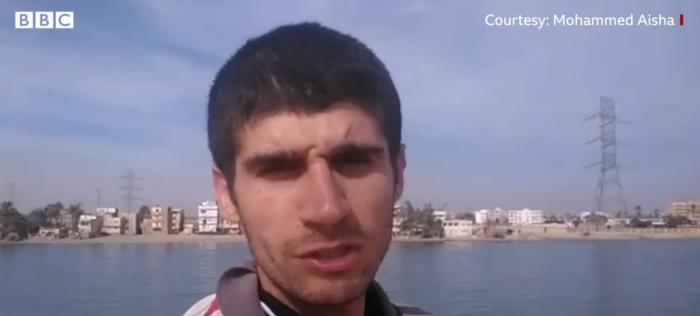 First Officer Mohammed Aisha had been stranded on the “cursed” MV Aman, for almost four years onboard, stuck off the Egyptian coast. He has finally been freed and has flown home to Syria.
First Officer Mohammed Aisha had been stranded on the “cursed” MV Aman, for almost four years onboard, stuck off the Egyptian coast. He has finally been freed and has flown home to Syria.
The BBC reports that it began in July 2017, when the MV Aman was detained at the Egyptian port of Adabiya. The cargo ship was held because it had expired safety equipment and classification certificates.
It should have been easy enough to resolve, but the ship’s Lebanese contractors failed to pay for fuel and the MV Aman‘s owners in Bahrain were in financial difficulty.
With the ship’s Egyptian captain ashore, a local court declared Mohammed, the ship’s chief officer, the MV Aman’s legal guardian.
Mohammed, who was born in the Syrian Mediterranean port of Tartus, says he wasn’t told what the order meant and only found out months later, as the ship’s other crew members started to leave.
For four years, life – and death – passed Mohammed by. He watched as ships sailed past, in and out of the nearby Suez Canal.
By August 2019, Mohammed was alone but for the occasional guard and trapped on a vessel with no diesel and, consequently, no power. He was legally obliged to stay aboard and was unpaid, demoralised and feeling increasingly unwell.
In March 2020, a storm blew the Aman off its anchorage. The ship drifted five miles (8km), eventually running aground a few hundred metres from the shoreline. It was terrifying at the time, but Mohammed thought it was an act of God. Now he was able to swim ashore every few days, buy food and recharge his phone.
According to the International Labour Organization, there are more than 250 active cases around the world where crews are simply left to fend for themselves. It says 85 new cases were reported in 2020, which is twice as many as in the previous year.
Mohamed Arrachedi of the International Transport Workers Federation, who took up Mohammed’s case in December, said this should be a moment for everyone in the shipping industry to reflect.
“The case of Mohammed has to serve to open a serious debate to prevent these abuses to seafarers on ships,” he told me.
The debate, he said, had to involve ship owners, port and maritime authorities and flag states.
“This drama and suffering of Mohammed Aisha could have been avoided if the owners and the parties with responsibilities and obligations to the ship had assumed their responsibilities and arranged his repatriation earlier.”
For his part, Mohammed said he felt trapped in a situation not of his making, cornered by Egyptian law and ignored by the ship’s owners. He said months would go by without communication – leaving him feeling let down and isolated.
Thanks to Bob McKane and David Rye for contributing to this post.
